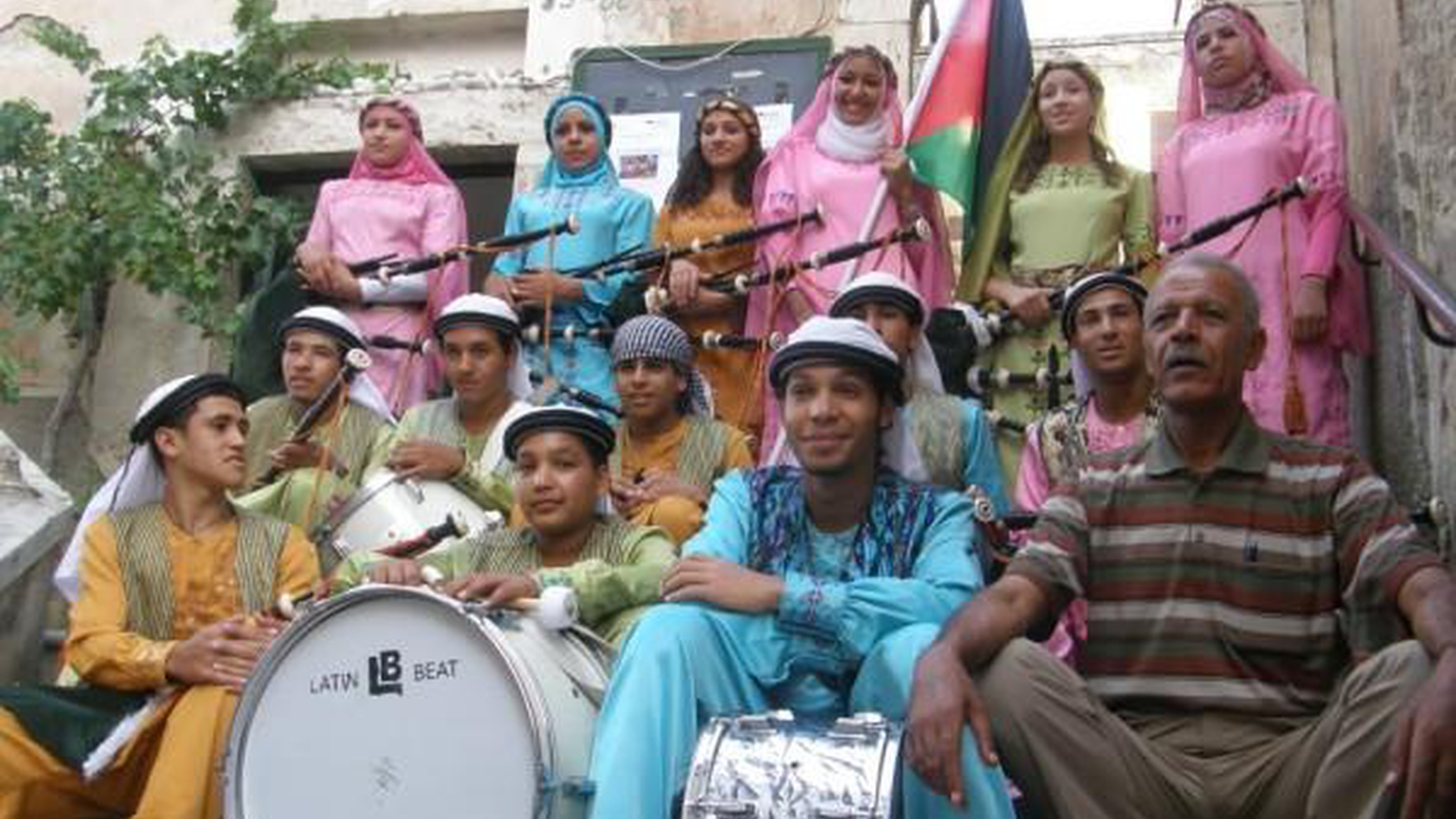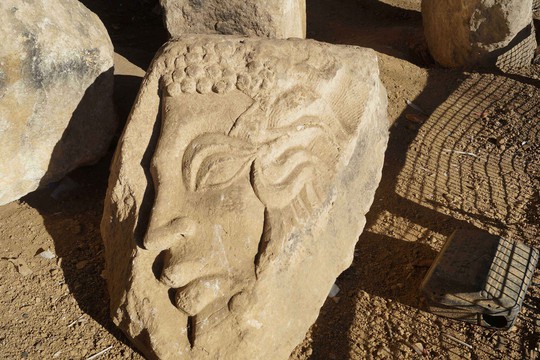Towards a radical politics of Musical Freespace
by Ed Emery
Nov. 30, 2018
A brief travel note :: Venice, Lesbos, Lebanon

Towards a radical politics of Musical Freespace
by Ed Emery // November 30, 2018
TOWARDS A RADICAL POLITICS OF MUSICAL FREESPACE
A brief travel note :: Venice, Lesbos, Lebanon
Ed Emery [SOAS]
[This article offers an account of a series of journeys in Autumn 2018 to explore the theory and practice of Musical Freespace and the 慚usic Room . A shortened version of this piece appears in the December 2018 English edition of Le Monde diplomatique.* Hence its somewhat compressed and journalistic style.]
MUSICAL FREESPACE vs. THE CRISIS OF MUSICAL SPACES
In mid-September I found myself with a bunch of SOAS musicians [School of Oriental and African Studies, London] aboard a traditional bragozzo of the Veneto, circumnavigating the perimeter of the 2018 Venice Architecture Biennale at the historic site of the Arsenale. We played music as went. Our intention was to protest at the pavilions represented at this year’s Biennale the exposition had the initially attractive title of “Freespace” as its theme, but it had nothing to offer as regards the crisis of live music, song and dance in our cities.
These musician-activists were in Venice for the conference “Towards a Radical Politics of Musical Spaces and Musical Citizenship”. [ ] Worldwide, there has been a tectonic shift in urban culture and a dramatic shrinkage of spaces for free musical expression. In Britain, pub culture is replaced by the imperialist culture of coffee houses where you sit in isolation with your laptop and social media, listening to pre-recorded music on headphones. You can’t sing in a Starbucks! In London the playing of street music is now controlled by stark regime of licensing, often limited to solo performers. Unlicensed buskers can be fined 1,000 and their instruments may be confiscated. A pitiful and impoverished spectacle of music encaged. Yesterday’s religiosity in British cities was Christian and choral. Today the church is in decline, the community singing is gone, and the city’s new religiosity is Islam, in which music, song and dance are generally regarded as haram (banned). Communal cultures are further hit by privatisation and enclosure. A small people’s choir in Cambridge, a phenomenally wealthy university city, can’t even find a space for their weekly rehearsal.
Landing at the imbarcadero, we went and posted a large printed manifesto on the front door of the Arsenale. It was a “Manifesto for Musical Freespace”. Included in its theses was a novel proposition. Addressing the world’s architects, urbanists and planners, it proposed that in these times of migration crisis, there should be provision of planned, safe and serviced spaces for music, song and dance for migrants and refugees. This is summed up in our concept of the “Music Room”, a concept that we are developing because music, song and dance are vital areas of empowerment a bedrock of personhood and we propose that they should be brought into the arena of internationally recognised human rights.
THE “HOME FOR ALL” PROJECT LESBOS, GREECE
As we know, huge numbers of refugees are currently blocked in the Greek island of Lesbos because of the collective unwillingness of the European Community to fulfil its humanitarian obligations. The Moria camp has become a prison and a byword for horror and violence, as charted in a recent BBC documentary. [ ]
A few miles from Moria, the road does a dog-leg turn at the water’s edge. A suitable place for a little harbour to have established itself. Across the road is a fish shop, in blue and white, displaying its wares. The owner is Nikos Katsouris, a former fisherman, whose little boat still sits in the harbour. Next-door is a small warehouse packed to the ceiling with donated goods for the refugees who are still arriving in their hundreds from the Turkish mainland. We sort gloves, scarves, socks, coats and hygiene items into special winter bundles for distribution at the camp.
Across the road is a restaurant, where Katerina, his wife, explains to volunteers that the principle of this place which calls itself “Home for All” is to invite people from the Moria camp (here they are known as “guests”, not “refugees”) into the peace and tranquillity of a Greek home. [ ] Long tables are neatly laid, with white table cloths, plates, glasses and cutlery, and good food is cooked by volunteers in the kitchen at the rear. Twice a day at 1.00 and 5.00 a minibus travels to Moria to bring the guests. On the day that I arrived the selected groups were Afghans families with young children and a group of Eritrean women dressed in colourful traditional costumes.
Nikos used to play bouzouki, playing rebetiko, the urban blues music of Greece. He hasn’t touched his instrument for 15 years. But crucially, at “Home for All”, a space has been created where the guests are now able to make music, away from the madness and violence of the camp. A local music teacher now works with young Afghan musicians making music. They compose their own songs, and make basic tracks. Via WhatsApp the tracks are then sent back to friends who have a studio in Afghanistan, to be mixed down into a finished product. Equally importantly, time is set aside for women guests from the Moria camp to come and relax, and to sing and dance, in a safe women-only environment. This is the “Music Room” in action.
BAGPIPES IN PALESTINE
Kassim Aine’s office was on fire when our team arrived to meet him in Beirut. Literally so, with an electrical short-circuit, a fire engine and billowing smoke. Fortunately we had been able to talk the previous day, and he had organised a programme of activities for us at the school for Palestinian children that his national welfare organisation [Beit Atfal as-Sumoud] runs in the nearby Shatila camp. This camp was the scene of the massacre of 2,000 Palestinians by right-wing Lebanese Christian forces in connivance with the Israeli army in September 1982, so these would be the children and grandchildren of the survivors of that massacre. [ ] On this particular morning the schoolchildren were gathered in the hall with their instruments (ney, ‘ud, violins, qanun) to give a little concert. They sang a medley of Palestinian and Lebanese songs. Then the dance teacher brought a troupe of boys and girls onto the dance floor, and they danced energetic and enthusiastic debka. The surprising fact was that their teacher’s pulsing music was played on a set of Scottish bagpipes.
My purpose in Lebanon was partly to carry a set of bagpipes to the Bourj al-Shamali Palestinian refugee camp in the south. These were purchased as a solidarity donation by students at the School of Oriental and African Studies [SOAS, London]. I had known that there was a Palestinian bagpipe band in Bethlehem (part of a century-long scouting tradition in Palestine, dating back to World War I), but had no idea of the wider significance of the pipes in Palestinian musical culture.
The Bourj al-Shamali camp is effectively an open prison, with Lebanese military strictly controlling entry of foreigners. At the camp’s checkpoint I was met by Abu Maher who took me to meet Abu Wassim, an amazing and endlessly inventive driving force of educational activism in the camp. We sat in the camp’s community hall, together with a number of the camp’s elders, drinking small cups of bitter Arab coffee. He explained the musical life of the camp. Among the young, he said, with unemployment and a high rate of drop-out from schooling, there is the ever-present danger that children will drift into drugs, into violence, or into the arms of the fundamentalist organisations. For him, music is the key. Music creates a unifying sense of discipline and community among young people. And since bagpipes are part of the cultural heritage of Palestine, some years ago he set his heart on creating a bagpipe band in Bourj al-Shamali. Against great opposing odds, it has to be said:
“At first it was really, really hard. We bought one practice chanter. But we had a problem for the reeds. We asked Beit Atfal [in Beirut] to get us some reeds. But they said no, because the reeds are expensive, and we have to get them from abroad. So what did we do? We took plastic drinking straws, and we cut them with scissors, and we made our own chanter reeds. The sound was not what the sound should be, but at least it was some kind of sound. When the Beirut people heard us playing, they laughed at us, but we didn’t care! We were making music in our own way.
“Then, as time went on, we got more bagpipes. Four bagpipes, of three different kinds. But the problem was that we had only one reed between four bagpipes. And we were supposed to be doing a public performance. So I told the children, take some paper and block the tubes of the drones. Then fill your pipes with air, and you will pretend that you are actually playing, even though you only have one reed between you.”
The opposition also came from fundamentalist Islamic organisations that oppose music, song and dance and particularly oppose the idea of boys and girls making music together. Preachers in the local mosques condemn this musical activism as the work of Satan.
As to how the pipes arrived in Lebanon, this was after Black September in 1970-71, when the Jordanian state turned against the Palestinian Liberation Organisation (PLO). The Jordanian army had a pipe band trained by the British. Palestinian pipers quit the army and came over onto the side of the Palestinian revolution. And as the musicians say, from that point the pipes became the sound of the Palestinian revolution.
Makeshift piping in Bourj al-Shamali is now a thing of the past, and the camp now has a strong group of 50 boys and girls, with pipers and drummers of both sexes. They have toured Italy and France, including the international bagpipe festival in L’Orient, where the town’s mayor presented them with 12 sets of pipes at €2,000 apiece. The struggle has been long and hard, but as Abu Wassim says: “If you believe in music and musical education, then you have to fight for it.” Once again, the “Music Room” in action.
THE FAYHA’ CHOIR
Since we have committed to creating an Arabic Choir in London, it was a particular pleasure to go for a fish supper with Barkev Taslakian the director of the truly amazing Fayha’ choir in Tripoli. [ ] He explained that this internationally celebrated troupe is the only Arab choir doing a capella four-part harmony in Arabic music. And for the past decade they have been creating choirs, working massively with young people in refugee camps in Lebanon, where one quarter of the country’s population are refugees. [ ]
In the Bekaa Valley they have a project working with Syrian refugee children. At first, says the Maestro, the newly arriving Syrian children were very well behaved. Now, as the new generation grows up in the camps, they are much more troublesome and hard to handle. He tells of knife fights and blood in the intervals during choir practice. Indeed, he says, all of the children carry knives.
Mr Taslakian has his secret ways of dealing with this violence. When he sets about forming the choir, his policy is deliberately to pick out the “bad boys”. The most troublesome ones, including potential suicide bombers (of whom there are apparently many, boys and girls alike). These he brings into the choir even if they have no capacity for singing. And so, slowly, the choir is formed, and the children have a choice of something other than anomie and violence. A textbook example of how the “Music Room” can work in practice.
The choir is also musically innovative. They harmonise Arabic song. Unusual and challenging, and traditionalists would perhaps demur. This tension between eastern and western ways of doing things is ever present in Lebanon. Not least for Mustapha Dakhloul, a 20-year old bagpipe player in Bourj al-Shamali. He learned the standard pipe repertoire through the Boy Scouts, but felt increasingly constrained by the Scouts’ westernised repertoires. When I mentioned by chance that I study ‘maqam’ music, [ ] the ancient and intricate art of Middle Eastern modal music as first expounded by Al Farabi, he instantly begged me to stay in the camp for a week to teach him what I know. There are many musical scales in Arabic music rast, saba, ussak, etc [ ] but he is starved of this Arabic heritage. He feels sad that the only one he recognises “in his ear” is hijaz, because that is the mode of the camp muezzin’s daily calls to prayer. Mustapha is something of a musical revolutionary and believes in “breaking the rules of the bagpipes”. [ ] In addition to piping with beat-boxers and rappers, he and a friend are now redesigning their bagpipe chanters to produce Arabic quarter-tones so that they can play the maqam repertoire. This opens the prospect of a minor revolution in Palestinian music.
E-mail: [email protected]
NOTES
-
https://mondediplo.com/2018/12/13music
-
Conference :: Musical Freespace: Towards a Radical Politics of Musical Spaces and Musical Citizenship
www.geocities.ws/musicalfreespace2018 -
BBC report on Moria camp:
https://youtu.be/8v-OHi3iGQI -
Video of “Home for All”:
www.facebook.com/ajplusenglish/videos/1120396604768512
. -
Journal of Palestine Studies 2018 report on new evidence for the Shatila massacre: https://palestinesquare.com/2018/09/25/the-sabra-and-shatila-massacre-new-evidence/
-
The website of the Fayha Choir: www.fayhachoir.org/
-
The choir have published four books on this aspect of their practice, including a book of repertoire.
-
Maqam Project @ SOAS:
www.youtube.com/user/MaqamProject -
Useful website for maqam theory:
www.maqamworld.com -
Mustapha Dakhloul’s channel:
https://youtu.be/BC_5cZgXskk
author
Ed Emery
other posts

Ethnomusicology in the age of immaterial labour
by Ed Emery / Aug. 20, 2018

